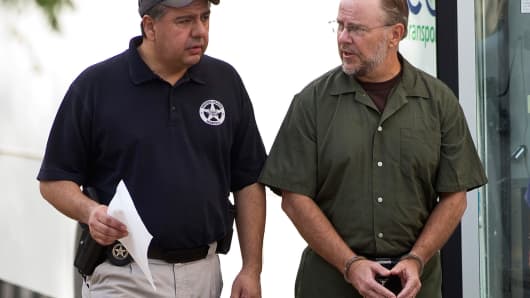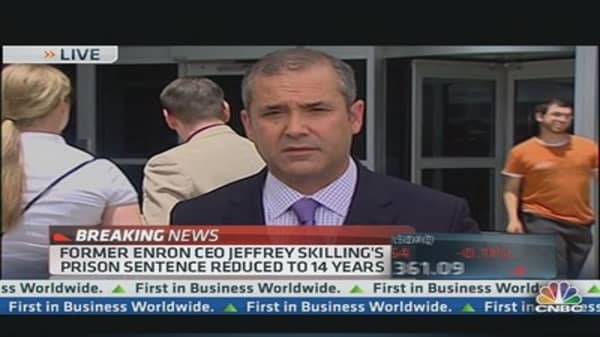Skilling was convicted in 2006 on 19 counts, including 12 counts of securities fraud and one count of insider trading. Skilling's offenses added up to 36 points under the federal sentencing guidelines, which would have resulted in a sentence of 188 to 235 months, or 15 to 19 years. But the trial judge added a four-point "enhancement" because Skilling allegedly jeopardized the safety and soundness of a financial institution, namely the employee retirement plans. That four point enhancement meant that Skilling could be sentenced to far more time, 292 to 365 months, 24 to 30 years.
The result was one of the harshest sentences ever handed down for a white-collar crime. As legal scholar Larry Ribstein pointed out, Skilling got 13 more years than Al Capone.
(Earlier: Former Enron CEO to Ask For Early Release)
Skilling's original sentence was overturned by the Fifth Circuit back in January 2009. The resentencing was delayed by ongoing litigation between federal prosecutors and Skilling lawyers. In 2010, the Supreme Court held that Skilling did not violate a federal law making it a crime to deprive another person of "honest services." The justices, however, declined to overturn Skilling's conviction and a federal appeals court later ruled that the conviction would stand.
Friday's agreement cuts one additional point off Skilling's sentencing level, so that the guidelines prescribe 168 to 210 months.
Skilling's sentence remains the longest of any convicted Enron executive. Former chief financial officer Andrew Fasto received a six year sentence and was released after five years. Chief accountant Richard Causey served less than five years. Both men agreed to testify against Skilling and Enron founder Kenneth Lay (who died before he was sentenced and whose conviction was later vacated). In the eyes of many, the gross disparity between these sentences indicates that Skilling was penalized for exercising his constitutional right to a trial.
"If we are so intent on punishing the wrongdoer with heavy prison time, then how can we accept Andrew Fastow being sentenced to 6 years, or Scott Sullivan receiving 1/5 of the sentence received by Bernie Ebbers. It becomes clear that what we are really doing here is punishing individuals who exercise their right to a jury trial. And permitting the government to continue this practice is not proper," the legal scholar Ellen Pogdar wrote shortly after the sentence was announced.
During his six years in jail, both of Skilling's parents and the youngest of his three children have died.
Skilling's conviction remains controversial. Prior to the trial, Skilling attempted to have the case moved away from Houston, arguing that he could not receive a fair trial. The court declined to relocate the trial. The Supreme Court ultimately rejected an appeal of his conviction on the grounds that the jury was tainted by Houston's hatred of Skilling but three justices agreed that Skilling's trial was unfair.
"For Houstonians," Justice Sonia Sotomayor wrote in an opinion joined by Justices John Paul Stevens and Steven Bryer, "Enron's collapse was an event of once-in-a-generation proportions. Not only was the volume of media coverage immense and frequently intemperate, but the sheer number of victims created a climate in which animosity toward Skilling ran deep and the desire for his conviction was widely shared."
Houston attorney Tom Kirkendall was even more direct, writing that "an angry mob lynched Jeff Skilling."
Skilling has always maintained his innocence. As part of the deal, however, Skilling has agreed to abandon his appeals.





